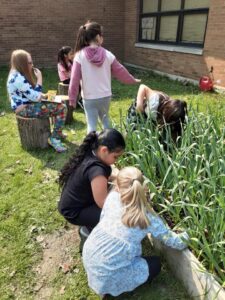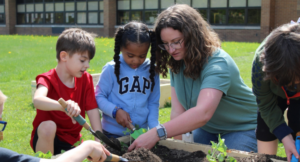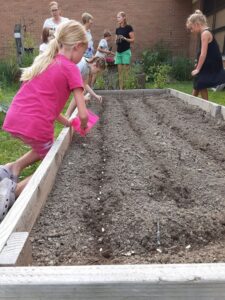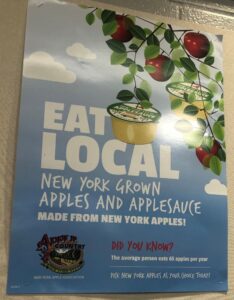When you live in Chautauqua County, your children get to learn all about the benefits that come with growing and eating locally sourced food, thanks to a “Farm to Table” program. Linnea Haskin, Community Food Systems Educator from Cornell Cooperative Extension, shares with us details about this unique program that’s making a big difference for some students in Jamestown.
By Linnea Haskin, Community Food Systems Educator
Cornell Cooperative Extension – Chautauqua County/Nutrition Program
For almost 12 years, I have had the pleasure of working among many sectors of Chautauqua County’s food system alongside an incredible array of dedicated farmers, food pantry managers, creative business entrepreneurs and countless community members. One factor that draws us together is our love for amazing ‘farm-to-table’ experiences in this beautiful county we are lucky to call home.
At the heart of a strong and resilient food system are our community’s children and schools where we have the opportunity to feed bodies and minds. A cherished memory I have comes from managing the Jamestown Mobile Market, a farmers’ market on wheels that visits a variety of locations within the city. One of those stops is C.V. Bush Elementary School.
 Each week, students, parents and staff visit to purchase fresh, local produce and often try samples of delicious recipes crafted by SNAP-Ed nutrition educators from Cornell Cooperative Extension.
Each week, students, parents and staff visit to purchase fresh, local produce and often try samples of delicious recipes crafted by SNAP-Ed nutrition educators from Cornell Cooperative Extension.
One of these students, Eli, remained in awe week to week as he learnt of the incredible variety harvested from our WNY growing season. I will never forget how he tasted a cherry tomato for the first time, only to declare it “not bad!” He proceeded to finish off a cup of tomato/corn salsa with pure excitement.
Eli, like many students in Jamestown, could easily spend his educational career exposed to little or no interaction with our food system.
However, over the years, I have realized we would be hard pressed to find individuals more passionate about our county’s food system, and the opportunities it presents for health and happiness, than teachers.
Chautauqua has 18 school districts, each one different in its composition because of our large geographic region. Traditionally, districts such as Pine Valley, Clymer and Sherman are thought of as more agriculturally focused due to their location on the beautiful rural outskirts of our county.
Children from across Chautauqua participate in 4H or Future Farmers of America (FFA) programs. Even more are exposed to our agriculture-rich community through farm-to-school cafeteria offerings, field trips, and school garden initiatives.
Taking a step back, it is important to realize that our local food system is not simply comprised of ‘traditional agriculture’ sectors, such as our large dairy or grape industry. In fact, our county food system represents all components of local food’s path from soil to soil, and and the growers, distributors, cooks, consumers, and food waste managers in between. Unfortunately, many students nationwide are exposed rarely or never to education surrounding food and agriculture. We are beyond fortunate that this is not the case for Chautauqua County!
 I have long been interested in the concept of Farm-to-School. Not only has research shown that children greatly benefit from such programming in terms of physical, mental and social health, it also can be downright fun. Children like Eli simply light up as they learn of plant and growing cycles, or culinary uses for fruits and vegetables. And of course, most love to get right in the dirt!
I have long been interested in the concept of Farm-to-School. Not only has research shown that children greatly benefit from such programming in terms of physical, mental and social health, it also can be downright fun. Children like Eli simply light up as they learn of plant and growing cycles, or culinary uses for fruits and vegetables. And of course, most love to get right in the dirt!
Many families are already heavily invested in our local agricultural spaces. Yet, despite the abundance of farms, u-pick fields, pumpkin patches, and farmers’ markets, there was a time I was unsure if students outside of more rural areas would find enjoyment in such programming. I am happy to say I was wrong!
In 2020, the staff at the Jamestown Public & Mobile Market (JPM), were approached by two teachers within the Jamestown Public Schools district. They had an ambitious goal: start the first school garden at the elementary level. While schools such as Persell and Washington Middle have hosted garden clubs for several years, younger students didn’t have such opportunities.
These teachers, Amy and Annie, knew that it was never too early to expose children to the wonders of growing food and flowers. They also knew it would be a daunting task. But they didn’t give up.
Establishing the Bush Garden Club at Bush Elementary School in Jamestown
 Partnering with the JPM, Amy and Annie formed a garden club committee, composed of district parents, cafeteria staff, and community members. This committee applied for and received a USDA Farm-to-School grant, funding the organizing and building of the district’s first elementary school garden. Thanks to over $13,000 in generous community donations, Bush Elementary’s first school garden opened in the spring of 2023. Since then, over 90 students have joined the the Bush Garden Club program which meets after school and over summers.
Partnering with the JPM, Amy and Annie formed a garden club committee, composed of district parents, cafeteria staff, and community members. This committee applied for and received a USDA Farm-to-School grant, funding the organizing and building of the district’s first elementary school garden. Thanks to over $13,000 in generous community donations, Bush Elementary’s first school garden opened in the spring of 2023. Since then, over 90 students have joined the the Bush Garden Club program which meets after school and over summers.
A variety of county community members and organizations have come to support the school’s garden club, including the Chautauqua Watershed Conservancy, Audubon Community Nature Center, St. Luke’s Episcopal Church, and True Value Home Center. Students plan to plant garlic each summer to sell in a fall fundraising event.
As Amy and Annie have shared, “This shows that our children are speaking and are eager to get outside, get a little dirt on their hands, and help contribute to the growth of something special.”
Farm to School Programs in Other Communities Across Chautauqua County
 In addition to school garden programs, several schools support Farm-to-School via their cafeteria services. Taking advantage of state support, schools such as Forestville and Cassadaga offer fresh, locally grown and raised products year-round from Chautauqua Grown farms. This can include blueberries freshly baked into breakfast muffins or local beef used for scrumptious tacos. Not only does this support our local farmers and economy, but children are also eating more nutritious and delicious foods. Some schools have hydroponic systems and children grow and harvest greens and herbs, enjoying them in lunches or as an afternoon snack.
In addition to school garden programs, several schools support Farm-to-School via their cafeteria services. Taking advantage of state support, schools such as Forestville and Cassadaga offer fresh, locally grown and raised products year-round from Chautauqua Grown farms. This can include blueberries freshly baked into breakfast muffins or local beef used for scrumptious tacos. Not only does this support our local farmers and economy, but children are also eating more nutritious and delicious foods. Some schools have hydroponic systems and children grow and harvest greens and herbs, enjoying them in lunches or as an afternoon snack.
Our Farm-to-School programming includes direct agriculture-focused educational opportunities, with instruction provided by Cornell Cooperative Extension of Chautauqua County and Erie 2 BOCES. Each year in March, almost every school district participates in NY State’s Agriculture Literacy Week. Other community centers, such as the North County Boys and Girls Club, also offer nutrition education and cooking classes.
Presently, some type of Farm-to-School programming exists in almost every district within the county!
It is one thing to be surrounded by beautiful and abundant farmland. It is another to know how much our community values and connects with Chautauqua’s unique agricultural landscape, and the importance of sharing that joy with future generations. I am proud to be a resident of Chautauqua County and am thrilled to know that when my future children attend school in this community, they will learn how to be gentle stewards of our local food system.
About: CCE-Chautauqua is a subordinate governmental agency with an educational mission that operates under a form of organization and administration approved by Cornell University as agent for the State of New York. It is tax-exempt under section 501(c)(3) of the Internal Revenue Code. The association is part of the national cooperative extension system, an educational partnership between County, State, and Federal governments. As New York’s land grant university Cornell administers the system in this state. Each Cornell Cooperative Extension association is an independent employer that is governed by an elected Board of Directors with general oversight from Cornell. All associations work to meet the needs of the counties in which they are located as well as state and national goals. For more information, call 716-664-9502 or visit our website at www.cce.cornell.edu/chautauqua. Cornell University Cooperative Extension provides equal program and employment opportunities.
(All images by Linnea Haskin)
